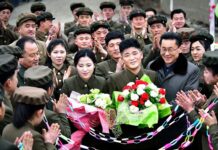South Korea’s Kim Young Ran Act (Improper Solicitation and
Graft Act) took effect on September 28. Although there are concerns regarding
an expected contraction in domestic consumption, the idea of laying strong
foundations for greater transparency is in itself noteworthy. It represents a
significant step forward for social progress if South Korean society enforces
universal fairness through the implementation of the act.
The act stipulates that it is illegal to provide gifts
costing more than 50,000 KRW (approx 45 USD) to those designated by the law, such
as civil servants, even if they are intended as a token of gratitude or
congratulations. Although there are worries that the act may damage healthy
social relationships, the South Korean government is determined to dismantle
chains of corruption within its society.
South Korea’s implementation of the Kim Young Ran act
indirectly draws attention to the endemic corruption of its northerly neighbor.
In January, Transparency International categorized North Korea as “catastrophic” in terms of social integrity, giving it an 8 out of 100 score on the Corruption
Perception Index. North Korea has held bottom place on the rankings for 5 years
in a row, together with Somalia.
According to North Korean defectors, even large bribes are
openly expected in society. All government officials, high-ranked, middle or
low-ranked alike, seek private gain through the direct abuse of their power,
openly asking for bribes of at least a few hundred dollars at a time.
“Lower ranking officials are required to bribe their
seniors, and senior officials must offer up bribes to higher-level officials in
the Party,” Kim Seon Woo, a former high-ranking North Korean official who
defected from South Pyongan Province in 2012 reported to Daily NK. “If you’re
not good with your bribes, even if you became a cadre because of your good
songbun (family political background and loyalty), at some point you may have
your post withdrawn.”
“It was horrendous during the holiday seasons. You
can’t leave out a single cadre member including the provincial Party secretary,
the provincial people’s committeeNorth Korean people's committees are akin to local governmen... More chairman, and especially the provincial head
prosecutor.” Kim added that especially in the case of the prosecutor, failure
to pay up adequate bribes would promptly lead to a clamp down on money-making
activities such as market sales and foreign currency-earning operations.
Hwang Chul, the former head of a foreign currency-earning
company who defected from North Pyongan Province in 2014 also commented that,
“Officials from the Ministry of State Security, especially the director
and the vice director, most frequently ask for bribes,” adding, “The more
powerful the official is, the more severe their requirements for bribery
become, easily demanding at least 500 USD at a time as a matter of routine.”
Consistent testimonies have also come from North Korean
defectors stating that corruption is most prevalent in the same law enforcement
organizations tasked with monitoring these illegal acts, and the law is now
considered a mere ‘facade’ in North Korea. Defectors also point out that
bribery has become more rampant under Kim Jong Un’s ‘reign of terror,’ as
officials capitalize on the frequent issuance of ‘orders’ and ‘instructions’
from the regime.
“If a trading company does not bribe the security
agency at an appropriate time, the agency launches an investigation,” Hwang
added. “They threaten to investigate illegal activities committed in the past,
which can even include bribing the very same agency, as a means of pressuring
them for payments.”
“The agency forces individuals and enterprises to offer
more bribes, and can then exploit the fact as more illegal actions are
undertaken, providing pressure points for further extortion,” Hwang noted. “As
a result, bribery in North Korea is ubiquitous and unavoidable.”
Mr. Kim also noted that, “Owing to frequent
instructions from Kim Jong Un, prosecutors have become more powerful as they
actively take advantage of the situation by soliciting bribes in exchange for
leniency. In North Korea where such ‘orders’ and ‘instructions’ emanate from
those who uphold the law itself, corruption is not expected to disappear
anytime soon.”
“However, Kim Jong Un has shown little interest in such
issues, even though his regime is little more than a ‘bribery republic,’ Kim
said. “In fact, these problems are unlikely to be addressed when the leader
himself is the largest beneficiary of the corrupt system,” he added.

















